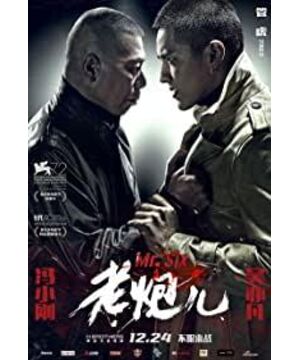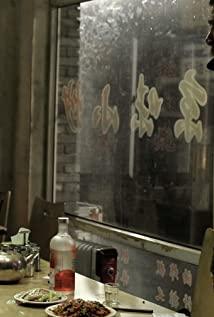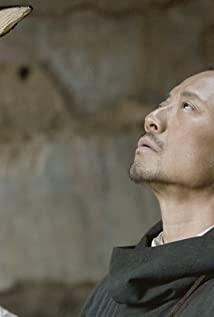What your dad said to you when he tried to pretend to be drunk was basically what it meant in the movie. It's a festival, it's something that young people put up with as soon as they grit their teeth. Eyes slanted upwards 45 degrees, pouted and hummed a little tune, and it was over. He couldn't hold back his mouth. On the eighth day of the new year, he was a hero again.
This movie can express the feeling that you want to have a fight with your parents and the old order of the old times. It's just that you want to make the whole world happy, but you have nothing to say about getting together with them. Then watch a movie, they are happy to let you live, and then you can have a happy year.
------------------------------------------
The story starts with a small thing.
The hawker selling pancakes was operating without a license, and was arrested by the city management, and the car that sold the pancakes was confiscated. During the dispute, the hawker smashed a light on the city management van, and the city management slapped the hawker.
The conflict was about to escalate, and Feng Xiaogang's "sixth brother" suddenly appeared, relying on all parties to give "face", he presided over a fair. His solution was: the hawker lost the car lights, the city management took over the pancake stand, and the hawker slapped the city management.
The core of the whole movie is "rules", and the sixth brother always complains that young people have no "rules". The rules he said were as big as "father, father and son", as small as how to say hello, and everything in the sky and the world was all-encompassing.
These rules permeate everyday life, and everyone in the show agrees with this set of rules, so these rules can exist unwritten forever. The people in the hutong are convinced that this is the universal law, "this is the principle wherever you go." These (supposedly) laws that transcend time and space make the sixth brother's life full of meaning.
There are no rules, Sixth Brother used to be a little bastard, but now he is an old bastard. With the law, the sixth brother is a knight when he is young, and a righteous man when he is old. Rules are elaborations, they are the sublimation of behavior into meaning. So the rules are always crucial to the triad and triad-like members.
But in practice, sometimes things are just and not just. For example, in the above example, the hawker loses money and tools to make money, so he can only save face. If the sixth brother did this, he would not be benevolent enough, and he would still not be able to win respect.
So it was Brother Six who paid for the city management and made a pancake car for the hawker. If the sixth brother's money is not enough, he calls on everyone to join in. The cost of "maintaining justice" was borne by the network of old residents in the old city.
In the world outside of martial arts novels, this human love network is the "Jianghu". The mainstream members of Jianghu are not knights, but three religions and nine streams. These people are willing to participate in this network of friendship, which is the so-called "loyalty".
The resilience of this Jianghu safety net can be strong or weak. Sometimes tens of thousands of dollars are about to break the net. But sometimes, such as the decapitation of the Qing Dynasty and the Ming Dynasty, it can be caught by this net.
The following is the official plot. Sixth brother is an old and stubborn owner. Now he runs a small shop in the alley and keeps a small pet starling. Nearly sixty years old, the past is like a cloud of smoke. One day, his son Xiaobo, whom he had almost cut off the relationship with, was caught by a rich and young gangster named Xiaofei. The reason is not worth mentioning, you rob my woman, I scrape your car and so on, rubbish trifles. Xiao Fei is the son of a high-ranking official in the south and hangs out with a group of people who refit cars.
Sixth brother inquired about the whereabouts of Xiaofei's group in the market, and went to negotiate with them, and the other party offered to pay 100,000. So the sixth brother went to collect the money and did everything possible to dig out 100,000 yuan from the "Jianghu" website. ——So far, it is the essence of the whole play, and the plot behind it begins to run around all over the street.
When the sixth brother went to pay the ransom, due to various reasons, the damage to the car became larger, and Xiaofei changed it to 1 million. Anyway, it is not affordable, Xiaofei suggested to solve it in a more fun way, let the sixth brother explain the current situation with "rules", and the sixth brother proposed "stubble". ——"Stubble" is an important intangible cultural heritage left over from the Cultural Revolution. It refers to group fights at a predetermined time and place in advance. Because there is time to prepare, both parties will initiate a general mobilization, and in the end, the person with extensive connections will win.
In the hutong, a group of middle-aged and elderly people over 500 years old are actively preparing for the battle. The audience was looking forward to an untimely car-chain fight. At this time, Xiaobo was secretly sent back. Some people in both camps felt that it was stupid to solve the problem with "stubble". This should be the end of it.
At this time, there were some touching family scenes, Xiaobo and his son had a long talk, and the sixth brother was checked for bleeding cancer.
As a result, Xiaobo accidentally brought back Xiao Fei's statement from a Swiss bank, which is evidence of Xiaofei's father's corruption. Xiaofei's father brought a group of people to find something and beat Xiaobo into a concussion. Brother Six's brothers were filled with righteous indignation. A group of adults behind the sixth brother Yue Xiaofei used stubbornness to tell right from wrong in the wilderness, but he had already sent the evidence to the Central Commission for Discipline Inspection. In other words, he was just here for revenge.
However, the sixth brother fell ill on the way, and the audience did not see a wonderful climax when a brick was hit on the forehead in the end.
In the last scene, a few days later, a group of old brothers who came with Sixth Brother came out of the detention center. They abandoned their homes and were young again, rosy and content.
This slightly out of control plot actually strictly abides by the few rules explained in the little incident at the beginning. That is:
1. You have to pay compensation for breaking someone else's car.
2. Violations must be punished.
3. It's wrong to hit someone.
At the end, there was a square dance-style gang fight, which was widely expected. However, in the end, it still failed to satisfy the audience's small desire, probably to say that violence cannot solve the problem. Although it is a commonplace, it looks sad when placed on an old man who will always cherish a violent era.
No country for old men. Your rules, values, meaning in life, objects of worship, knowledge, experience, glory, admiration, are all out of date.
That young you, looking at this old you—because he's such an awesome, straight-forward young man—he might say, "Why don't you die?"
You think he's right, Because you are him. It's just that you have to implement those rules until you die. As long as you keep implementing them, you can prove that those are the rules that transcend time and space and are the truth of the universe.
The film is about four groups of people: the older generation of commoners, the younger generation of commoners, the older generation of powerful people, and the younger generation of powerful people.
The sixth brother is the older generation of civilians, they used to be more powerful than the powerful. In addition, the sixth brother will fight, and he is a shining nobleman of the common people. In the eyes of those who know, this light has been shining until now.
Xiao Fei is a powerful young man. The main contradiction in this story happened between Brother Liu and Xiao Fei. In this day and age, those who can fight can only be shit, and those who shine are the rich.
In the current value system, the "human relationship network" is not a must. After the accumulation and concentration of wealth, a small number of people can bear the cost of "maintaining the rules" by themselves. They don't need to join forces, they don't need to borrow money, and they can solve all problems by saying, "No need to pay it back." Xiao Fei is such a person, of course he became the boss of a group of gangsters.
And young commoners have neither the ancient "loyalty" nor the modern "capital". The young people shown in the film are unsympathetic and indifferent. The power of capital is so great that the risk-taking ability of the "renqing network" is not worth mentioning in front of a wealthy person. It is better to rely on "rules" than to rely on capital.
When the younger generation of civilians is dissatisfied with the capital rules, he can only vent out indiscriminately. Xiaobo secretly hooked up with girls, secretly rowed other people's cars, but it was just a blind bump, and in the end, he had to bear the consequences himself.
According to the plot arrangement, Xiao Fei, who presides over the modern rules, has admiration for the ancient rules of the rivers and lakes. Of course, what he admires is the demeanor of being consistent in his words and being a chivalrous person, not the embarrassment of raising money everywhere. On the surface, the contradiction between Brother Six and Xiao Fei is the main axis of the story, but this is not a real contradiction. This contradiction starts with a farce and ends with a farce. There is no difference in values between the two.
There are also two branches of conflict in the film, the generation gap between Xiaofei's father and son and Xiaobo's father and son. This kind of contradiction is bound to exist and is bound to be unsolved, and the drama really uses family affection to mix up the past.
The conflict between the generation gap can of course be discussed at length, but it is too literary. Do you think this is an art film? It certainly looks like a literary film, but it's not. It is a film that must win justice, also known as the "mainstream New Year's favorite" film. Therefore, it must launch a big boss when the plot is over 2/3 so that you can enjoy watching it and have a good year.
This is the conflict between Brother Liu and Xiaofei's father. That is, among the older generation who advocate violence, the contradiction between the grassroots and the powerful. This would have been a real contradiction, but the plot didn't explore it. So in general, this should be a very heavy, nostalgic and time-sensitive film, but it's a farce, and you have to fight the boss after the trouble, how to be happy. Still very suitable for family viewing.
But it also has a 15-second passion scene on its head! What are you doing! What do you want me to recommend to my mom? ? ? And who wants to see Feng Xiaogang's ass? ? ? What are you thinking? ? ? Raising a movie rating is just to show Feng Xiaogang's ass! does it worth? ? ? You ask yourself, is it worth it? ? ?
Long-winded up to now, there is still a little gossip I want to talk about, which is about the now popular "middle-aged and old people muttering to themselves".
Over the past few years, it has become very popular in various countries to shoot the muttering of middle-aged and elderly people. why? It is also very simple, because it is the 70th anniversary of the victory of the Anti-Japanese War.
After World War II, the baby boomer generation that broke out in the 1950s has entered the middle-aged and old age in modern times. They have grown with the times, developed from the worst to the best, and built the world from a violent old society to a new, highly industrialized society. Now that they are middle-aged and old, they have gradually transitioned from the society they brought up in the ruins to the next generation, gradually out of their control, and emerging cultures without their participation are emerging one after another. In their view, a society divorced from the old culture is disordered, new, and incomprehensible. Although, they have also taken over this society from the older generation, and they have broken and established a lot.
Such a huge group has a need to mumble and should be fully embraced by us. The repeated occurrence of such themes should not be carried over with the phrase "lack of novelty". How many times has the theme of teenage thoughts been repeated? Which one is not copying each other and one is more hypocritical than the other? Just because teenagers have a need to be understood, such topics can be consumed again and again, so why can't the elderly keep mumbling to themselves?
Even if the middle-aged and the elderly deny us and think that we are all squeamish, withdrawn and playful bastards, we must accept them. If the modern generation has anything to be proud of, it's that our culture is more tolerant. We are transitioning from a hard-working society to a humanistic society, and literary and artistic works are meant to describe the present society, including what it is losing and what it is about to welcome.
On the other hand, it must be mentioned that Chinese films have consistently denied the values of the younger generation. For example, in this movie, young people have nothing to gain, their only task is to "inherit". It is not just Chinese movies. It should be said that middle-aged and elderly people all over the world have a tendency to "keep the status quo as much as possible", and hope that the next generation will accept this old-fashioned value and all the old things that exist in the world.
I think that if society wants to progress, we must encourage young people to have a process of "criticism-acceptance-criticism-acceptance" of the old. Youth culture is bound to be rebellious. Only after rebelling from beginning to end can we objectively think about what is worthy of acceptance. Our society is reluctant to give teenagers this opportunity, to give them a thought process.
The young man admired by the media must be nostalgic, he can rebel against his own parents, but must worship something older, he cannot thoroughly reflect on everything around him and feels helpless and angry because of it. This is the most common living state of young people nowadays, but it cannot be accepted and expressed by literature and art at all, which is very regrettable.
According to my personal opinion, I think the children born in the 80s are better than the children born in the 70s, the children born in the 90s are better than the children born in the 80s, and the children born in the 00s are better than the post 90s. The times must develop, how many years do you want to open the country? Are you tired of always holding on to the grandeur of founding a country? Realistic or not? Can't pass it later? Let's think about it, shall we?
By the way, people often say that I'm a bitch, and all the good things are said to be particularly wretched. I may have said that this film is bad, but it is actually very good, I gave it five stars. The plot was super nice before the turning point, and my parents would like it very much. It's that little bit of nude scenes that will make the whole family feel like they are sitting on pins and needles.
View more about Mr. Six reviews











